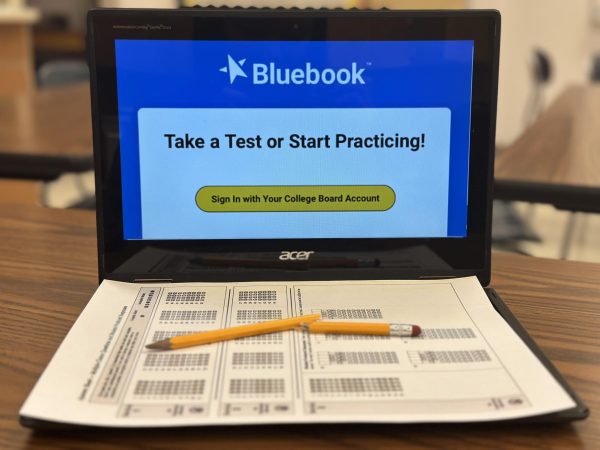
After allowing school districts to choose whether or not to participate in their pilot digital AP tests during the 2024 AP testing season, CollegeBoard has made the decision to accelerate their transition to digital AP exams nationwide amidst test security concerns caused by a group of students purchasing stolen exam materials. Starting in the 2025 AP testing season, all AP tests will either be fully digital, hybrid or unchanged.
The fully digital AP tests will have both multiple choice and free response questions entirely online, after which student responses will be automatically submitted after completion. These include AP Art History, AP Computer Science A, AP Computer Science Principles, AP English Language and Composition, AP English Literature and Composition, AP Environmental Science, AP European History, AP Human Geography, AP Psychology, AP Seminar, AP United States Government and Politics, AP United States History and AP World History: Modern.
Hybrid exams will similarly have students complete their multiple choice questions digitally; however, students will view their free response questions digitally and write their answers in a traditional paper booklet. This format accommodates subjects that utilize graphing or symbolic notation, including AP Biology, AP Calculus AB, AP Calculus BC, AP Chemistry, AP Macroeconomics, AP Microeconomics, AP Physics 1: Algebra-Based, AP Physics 2: Algebra-Based, AP Physics C: Electricity and Magnetism, AP Physics C: Mechanics, AP Precalculus and AP Statistics.
AP 2-D Art and Design, AP 3-D Art and Design, AP Drawing, AP French Language and Culture, AP German Language and Culture, AP Music Theory, AP Research, AP Spanish Language and Culture and AP Spanish Literature and Culture will remain unchanged in their exam administration, but may transition to digital formats in the future.
The digital sections in fully digital and hybrid exams will be administered through BlueBook, the same platform used for digital PSAT/SAT testing. While the means of testing have changed, the basic aspects of the tests have not; this includes the number of sections, number and type of questions, question choice and timing. There will be a 10-minute break automatically given between sections. Similarly to PSAT/SAT testing, the BlueBook interface will include a Desmos graphing calculator (with the exception of AP Statistics) and any reference sheets provided by the AP exam. Physical reference sheets will no longer be provided except for a periodic table for AP Chemistry. Late exams will also be administered in the same manner as their original exams.
If a student’s internet disconnects or their battery life runs out, the exam will be automatically saved and no testing time will be lost. The start and submission of the exam require an internet connection, but the testing process can happen completely offline.
“I have mixed emotions about all of this,” said East’s ACT and Advanced Placement test coordinator Matt Gill. “I think [the switch] will be different. It’s hard to say if it’ll necessarily be beneficial.”
The potential benefits of digital testing focus on test efficiency, security and accessibility. Undoubtedly, this new format will expedite test administration and the shipping of test materials. “Efficiency-wise, on the day of the test, there’s not gonna be a lot of time spent distributing material and collecting material for the fully digital exams,” said Gill.
In theory, this will also greatly improve test security, as tests won’t need to be shipped out weeks before the testing date. It will also make grading handwritten responses much more consistent, as graders won’t have any misunderstandings if they’re unable to read a student’s work. The digital format aims to be more accessible to students, as the test is easily able to be administered on common devices and appeals to a format that students may be more familiar with in terms of typing and answering questions online.
However, digital testing doesn’t come without drawbacks. An important factor to consider is the effect that physically writing may have on a student’s cognition during the exam. “Brain research will say that there’s more areas of the brain activated by the act of writing, so there’s some credence to this idea that writing and paper and pencil tests may be better in terms of activating more regions of your brain,” said Gill. “At the end of the day, I like paper tests simply because I feel like writing is thinking, and I feel that people do well when they have that ability to just put pen to paper.”
A benefit that Gill hopes to see with digital testing is a cost reduction for AP exams, which hasn’t been mentioned in the information regarding the new digital format. Without the shipping costs associated with traditional exams, the money saved in that regard could be taken out of a fee that is typically around $100 or more per test. “I would love to see that because for some, that creates a little more accessibility,” said Gill. “I would love to see that obstacle removed and that would be a great benefit of digital testing, potentially.”
Regardless, Gill encouraged students to prepare for whatever AP exam they may be taking. “The best thing anyone can do is to prepare for that environment,” he said. “So if you know that’s what you’re going to be expected to do, having a test preview or a practice test [on the CollegeBoard site], I would definitely recommend that all students do that.”
AP testing will begin on May 5 and conclude on May 16. If you’re looking to prepare for an AP Exam, test previews are available on BlueBook for all students. For further information, visit the AP Central website for answers on what to expect this spring as well as introduction videos to each of the formats.








